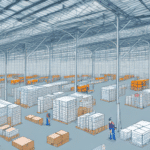Importance of Logistics Delivery Services for Modern Businesses
Logistics delivery services are integral to the seamless operation of businesses across all industries. They manage the transportation, storage, and timely delivery of goods, ensuring that products reach customers efficiently and reliably. Effective logistics delivery enhances customer satisfaction and loyalty by meeting delivery expectations and maintaining product quality.
Outsourcing logistics allows businesses to focus on their core activities while leveraging the expertise of specialized providers. This not only reduces operational costs but also improves overall efficiency, contributing to increased profitability. According to a Statista report, the global logistics market was valued at over $8.6 trillion in 2023, highlighting its critical role in global commerce.
Selecting the Right Logistics Delivery Service Provider
Industry Experience and Service Range
When choosing a logistics provider, it's essential to consider their experience in your specific industry. Providers with industry-specific knowledge can offer tailored solutions that meet your unique needs. Additionally, a wide range of services—from warehousing and inventory management to last-mile delivery—ensures comprehensive support for your supply chain.
Technology and Infrastructure
A robust technological infrastructure is crucial for efficient logistics operations. Providers should utilize advanced systems for real-time tracking, inventory management, and seamless communication. Technologies like IBM's supply chain solutions enhance visibility and enable data-driven decision-making.
Reliability and Customer Feedback
Evaluate potential providers based on their reliability and customer testimonials. Reliable providers consistently meet delivery deadlines and handle goods with care. Checking reviews and seeking references can provide insights into a provider’s performance and customer satisfaction levels.
Outsourcing Logistics to Streamline Your Supply Chain
Operational Efficiency and Cost Savings
Outsourcing logistics can lead to significant cost savings by reducing the need for in-house resources and infrastructure. It allows businesses to benefit from the provider's economies of scale, optimizing transportation routes and minimizing expenses. This efficiency can translate to improved profit margins and competitive pricing.
Enhanced Supply Chain Visibility
Partnering with a logistics provider offers greater visibility into your supply chain. Real-time tracking and comprehensive reporting tools enable businesses to monitor shipments, manage inventory levels, and respond swiftly to any disruptions. Enhanced visibility supports better forecasting and inventory management, reducing the risk of stockouts or overstocking.
Risk Mitigation
Logistics providers often have contingency plans to handle unexpected events such as natural disasters or supply chain disruptions. Their expertise in risk management ensures that your deliveries remain on track, minimizing potential losses and maintaining service reliability.
Leveraging Technology to Enhance Logistics Efficiency
Advanced Tracking Systems
Modern logistics providers employ technologies like GPS tracking and RFID to monitor shipments in real-time. These systems provide accurate location data and estimated delivery times, enhancing transparency and enabling proactive management of the supply chain.
Automation and AI
Automation technologies streamline processes such as order fulfillment, inventory management, and shipping. Artificial Intelligence (AI) and machine learning algorithms optimize routing, predict demand, and improve decision-making, leading to faster and more accurate deliveries.
Integration with Supply Chain Systems
Seamless integration with existing supply chain management systems is essential for efficient logistics operations. Technologies like SAP Supply Chain Management enable smooth data exchange and coordination between different stages of the supply chain, ensuring consistent and reliable operations.
Cost Reduction Strategies through Logistics Delivery Services
Optimizing Transportation Routes
Logistics providers use sophisticated software to design the most efficient transportation routes, reducing fuel consumption and transit times. Route optimization not only lowers costs but also enhances delivery speed, contributing to better customer satisfaction.
Economies of Scale
By leveraging their large-scale operations, logistics providers can negotiate better rates with carriers and suppliers. These savings are often passed on to businesses, making outsourced logistics a cost-effective solution.
Data-Driven Cost Management
Access to detailed analytics and reporting tools allows businesses to monitor and control logistics expenses effectively. Data-driven insights help identify cost-saving opportunities and improve financial planning.
Enhancing Customer Experience and Sustainability in Logistics
Improved Delivery Accuracy and Reliability
Reliable logistics services ensure that products are delivered on time and in excellent condition, which significantly improves the customer experience. Accurate delivery estimates and consistent performance build trust and foster long-term customer relationships.
Green Logistics Solutions
Adopting sustainable logistics practices helps reduce the environmental impact of delivery operations. Solutions such as using electric vehicles, optimizing packaging, and implementing energy-efficient warehouse practices contribute to a greener supply chain. According to the International Trade Association, sustainable logistics can enhance brand reputation and meet growing consumer demand for eco-friendly practices.
Personalized Customer Support
Providing personalized and responsive customer support improves the overall logistics experience. Effective communication, real-time updates, and tailored solutions address customer needs and enhance satisfaction.
Future Trends and Overcoming Challenges in Logistics Deliveries
Emerging Technologies
The logistics industry is rapidly evolving with advancements such as drone deliveries, autonomous vehicles, and blockchain for transparent and secure transactions. These technologies promise to revolutionize logistics by increasing speed, reducing costs, and enhancing security.
Adapting to Market Changes
Businesses must stay adaptable to navigate challenges like fluctuating demand, regulatory changes, and geopolitical instability. Flexibility and proactive planning are essential for maintaining efficient logistics operations in a dynamic environment.
Addressing Common Challenges
Common challenges in logistics include delays, lost shipments, and damaged goods. Partnering with a reliable logistics provider and implementing best practices such as accurate demand forecasting and effective risk management can mitigate these issues and ensure smooth operations.
In conclusion, optimizing logistics delivery services is vital for enhancing operational efficiency, reducing costs, and improving customer satisfaction. By carefully selecting the right provider, leveraging advanced technologies, and adopting sustainable practices, businesses can strengthen their supply chains and maintain a competitive edge in the marketplace.



















